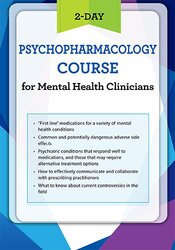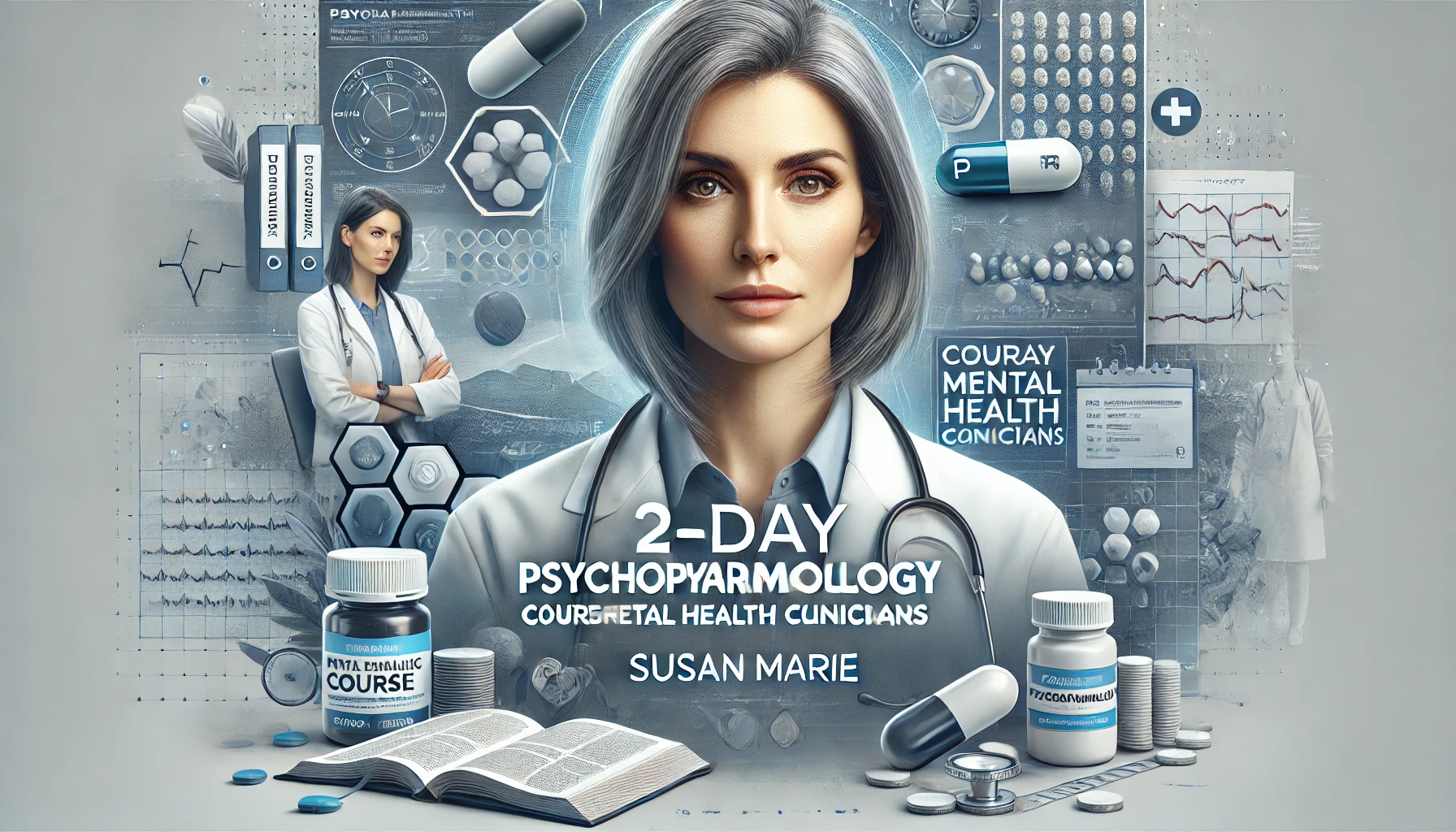2-Day Psychopharmacology Course for Mental Health Clinicians – Susan Marie
2-Day Psychopharmacology Course for Mental Health Clinicians – Susan Marie has the same quality as the author’s salapage.
Overview
Discover the Best Learning with 2-Day Psychopharmacology Course for Mental Health Clinicians – Susan Marie
WisMentor is your ultimate destination for online learning. Explore "2-Day Psychopharmacology Course for Mental Health Clinicians – Susan Marie" by top authors and instructors, designed to transform your skills and career. Start now and unlock your potential!
Salepage check: 2-Day Psychopharmacology Course for Mental Health Clinicians
Author: Susan Marie
- Faculty:
- Susan Marie
- Duration:
- 11 Hours 59 Minutes
- Format:
- Audio and Video
- Copyright:
- Aug 26, 2019
Description
Clients taking psychotropic medications need an advocate who can help them make sense of the whirlwind of information regarding what drugs are good for what conditions, potentially dangerous side effects and adverse reactions, and possible alternative treatments.
They need someone who can not only effectively communicate vital information to them but can also collaborate with prescribers to determine the best course of action to take.
Simply put, these clients need you, and so you need this current and comprehensive training in psychopharmacology.
As a licensed psychiatric nurse practitioner with full independent prescriptive practice, Susan Marie, PHD, PMHNP, CARN-NP has the expertise necessary to guide you through the newest advances in psychopharmacology and contemporary trends in medication management.
You will get the advantage of an intimate, in-depth look at the key issues from a vantage point that understands the experiences of clients, mental health professionals, and prescribers.
Susan’s engaging presentation includes many take home “pearls” you can use to teach your clients about their medications and how to protect them from concerning, dangerous or adverse effects.
You will find this recording to have the most up-to-date medication information and how to use it most effectively with your clients.
Handouts
| Manual – 2-Day Psychopharmacology Course for Mental Health Clinicians (11.6 MB) | 137 Pages | Available after Purchase |
Outline
THE VITAL, AND EXPANDING, ROLE OF THE MENTAL HEALTH CLINICIAN IN PSYCHOPHARMACOLOGY
- Understand, and explain, drug metabolism and mechanism of action
- Recognize when to refer for medication, and how to increase client interest and participation
- Develop highly effective collaborations with prescribers
WHAT THE MENTAL HEALTH CLINICIAN NEEDS TO KNOW ABOUT
Depressive Disorders
- Neurochemistry of depression
- Controversy regarding antidepressants and placebo – Who to treat when?
- Types of antidepressants – pearls and pitfalls of different agents
- Managing side effects
- Treatment-Resistant Depression and drug combinations
Anxiety, Obsessive-Compulsive, & Trauma-Related Disorders
- Neurochemistry of anxiety
- SGAD, panic disorder, phobias
- OCD
- PTSD
- Physiological interventions
- Anti-anxiety medications
- Antidepressants
- The many other options often ignored
- Benzodiazepines: risks and benefits
- How to recognize problematic prescribing patterns
- Getting off benzos: key pearls for success
- Managing side effects
Bipolar Disorders
- Neurochemistry and symptoms
- The Bipolar Spectrum concept & DSM-5® changes
- Types of mood stabilizers, when to use which and potential adverse effects
- Lithium
- Anticonvulsants
- Atypical antipsychotics
- Augmenting agents
- Effective strategies for improving outcomes for clients
- Using blood levels effectively – what the prescriber may not be watching
- Treating pregnant or potentially pregnant women with bipolar disorder
Psychotic Disorders/Schizophrenia
- Neurochemistry of psychosis and schizophrenia
- Antipsychotic Medications:
- First generation (typical)
- Second generation (atypical)
- Managing side effects
- Extrapyramidal symptoms and TD
- Metabolic problems – what blood tests are needed and when
- Preventing Diabetes Mellitus
- Recognizing hyperprolactinemia – and why you need to know
- Use of atypical antipsychotics for multiple disorders
- Pregnancy and psychotic disorders
Attentional Disorders
- Differential diagnosis
- Neurochemistry of ADHD
- Controversy about treatment of ADHD with stimulants
- Substance abuse and ADHD
- Stimulant medications
- Non-stimulant options
- Managing side effects
Sleep Disorders
- Differential diagnosis
- Chicken or the egg? What came first, sleep problems or mental illness?
- Controversy about treating sleep problems with hypnotics
- Sleep interventions that really work
- Hypnotic medications: risks and benefits
- Alternatives to hypnotics
- Recognizing adverse effects
Substance Use Disorders
- Neurochemistry of addiction & habit development
- Drugs of abuse and interaction with psychiatric medications
- Caffeine
- Nicotine
- Marijuana (discussion of medical marijuana, cost vs. benefit)
- Others
- Challenging the old thinking about when to prescribe for clients with dual diagnosis – what we now know
- Medication assisted treatments for addictions
- Alcohol
- Nicotine
- Cannabis
- Opiates
- Behavioral addictions – what we know works
Eating Disorders
- Anorexia, bulimia, binge eating disorder
- Weight gain from psychotropic medications
- Recognizing medical emergencies
- Standard of care for lab work
- Integrating psychotherapy with psychopharmacology
Special Populations: Geriatric
- Specialized guidelines for geriatric clients
- Discussion of dementia treatment
- Antipsychotic controversy
Special Populations: Women
- Hormonal issues in mood disorders & anxiety
- Pregnancy and breastfeeding – Presenting the choices
- Resources for you and your clients
- The dangerous, the concerning, and the possibly good options for psychopharmacology
Use of Complementary and Alternative Agents Across Psychiatric Conditions
- Safety issues
- Proven efficacy and dosin
Faculty

Susan Marie, PhD, PMHNP, CARN-AP Related seminars and products: 3
Clinical Associate Professor
Susan Marie, PhD, PMHNP, CARN-AP, a licensed psychiatric nurse practitioner with full independent prescriptive practice and certification in addictions, brings to you over 30 years of clinical experience with highly vulnerable clients with suicidality, co-occurring addiction, homelessness, serious mental illnesses, traumatic brain injuries, and persistent pain conditions. She is noted for her “pearls and pitfalls” of psychopharmacology. Her passions are radical respect for people with serious mental illnesses & addictions, excellence in psychopharmacology, and integrating psychotherapeutic interventions for clients with PTSD, addictions and chronic pain.
Dr. Marie is Senior Clinical Director for Behavioral Health at Old Town Clinic, Central City Concern and Associate Professor at Oregon Health and Science University in Portland, Oregon. She teaches nationally on psychopharmacology as well as suicide assessment and intervention.
Speaker Disclosures:
Financial: Susan Marie is an Associate Professor for Oregon Health & Science University. She receives a speaking honorarium from PESI, Inc.
Non-financial: Susan Marie has no relevant non-financial relationship to disclose.
About 2-Day Psychopharmacology Course for Mental Health Clinicians – Susan Marie and Our Expert Authors
2-Day Psychopharmacology Course for Mental Health Clinicians – Susan Marie is part of our extensive collection of over 70,000 premium courses at WisMentor. Created by renowned authors and industry leaders, this course is tailored to provide cutting-edge knowledge and actionable insights.
Why Choose WisMentor?
- 🌟 Access courses from world-renowned authors.
- 📚 Wide range of topics to suit your professional and personal growth needs.
- 💼 Lifetime access and flexible learning options.
Key Features of 2-Day Psychopharmacology Course for Mental Health Clinicians – Susan Marie:
- ✅ Comprehensive content covering essential topics.
- ✅ Evidence-based methodologies and practical examples.
- ✅ Learn at your own pace with expert guidance.
How to Access Your Course?
Getting started is easy:
- 📩 Receive an instant download link via email.
- 🌐 Access your course anytime through your account dashboard.
- 📱 Compatible with all devices for a seamless experience.
Need Help?
Our dedicated support team is here to assist you. Visit our Contact Us page or reach out via email for any queries or assistance.
More from Our Collection:
Don’t miss the opportunity to explore more courses from top authors and enrich your learning journey at WisMentor. Find your next course now and take your skills to the next level.
Curriculum
FAQs
Requirements
- Prerequisites: Basic understanding of psychopharmacology principles is beneficial but not mandatory.
- Licensure: Current licensure or certification in a mental health profession is preferred.
- Professional Experience: A minimum of one year of clinical experience in mental health settings is recommended.
- Educational Background: Participants should hold a degree in mental health disciplines such as psychology, psychiatry, nursing, social work, or counseling.
Features
- Certificate of Completion: Earn a certificate recognizing your advanced training in psychopharmacology.
- Comprehensive Resources: Participants receive up-to-date materials on medication information and management techniques.
- Interactive Learning: Engaging presentations with practical takeaways to apply in clinical settings.
- Expert Instruction: Led by Dr. Susan Marie, a licensed psychiatric nurse practitioner with extensive experience in psychopharmacology.
- In-Depth Curriculum: Covers the latest advancements in psychopharmacology, including new medications and treatment strategies.
Target audiences
- Graduate students in mental health fields preparing for roles that involve understanding psychotropic medications.
- Counselors and therapists aiming to enhance their collaborative practices with prescribing professionals.
- Psychiatrists, psychologists, psychiatric nurse practitioners, and clinical social workers involved in medication management.
- Licensed mental health professionals seeking to deepen their knowledge of psychopharmacology.
- Prerequisites: Basic understanding of psychopharmacology principles is beneficial but not mandatory.


